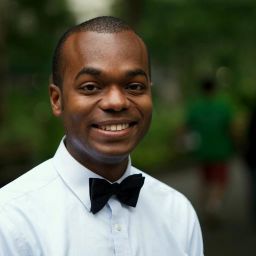Editor’s Note: Brandon Tensley is the assistant editor at New America. He is also a contributing writer for Pacific Standard magazine. He was a 2015-16 Luce Scholar in Thailand and a 2012-13 Fulbright Scholar in Germany. The views expressed here are solely those of the author.
Story highlights
Brandon Tensley: Jackson has peeled back yet another layer of what, exactly, true representation means
There's no question that Jackson's comments made some of those shades of representation clearer, Tensley says
It seems like everyone is talking about Jordan Peele’s hit film “Get Out” – including Samuel L. Jackson, who wonders: What might movies featuring British black actors who must navigate American racism be like if these movies were, instead, to star their American counterparts?
Or in Jackson’s words, speaking to a New York radio station: “I tend to wonder what that movie would have been with an American brother who really feels that,” he said. “Daniel [Kaluuya, who stars in “Get Out” as an African-American photographer] grew up in a country where they’ve been interracial dating for 100 years. What would a brother from America have made of that role? Some things are universal but [not everything is].”

Jackson has a point. The histories of race in America and in Britain are not the same, and so the context for an actor’s portrayal of an African-American’s experience – even fictional – will not be interchangeable.
On the one hand, I’ll admit that I’m not fully convinced this is the most crucial conversation we ought to be having about the perennial paleness of Hollywood. Given that the film industry, for reasons that are structural, continues to sideline nonwhite work, I’m happy that black people —American and British and all other stripes — are being represented on the big screen with some nuance and texture. That said, Jackson, as he always seems to do, has peeled back yet another layer of what, exactly, true representation means; in other words, who gets to tell whose stories?
For instance, when we think about a film such as “Hidden Figures,” it’s indisputable that so many black Americans, especially black women, have rallied around the film’s stars — Taraji P. Henson, Janelle Monáe, and Octavia Spencer — with such vigor because they’re portraying our culture, our history and our stories.
While it’s impossible to augur, for certain, an accurate answer, there’s a question to be asked about how that same film might have been inflected, even a touch, had non-American black performers been cast. How would somebody not shaped by America’s monstrous racial history have chosen to channel that legacy when Spencer’s character explains to her sons, sagely, the importance of not believing that something is right “just ‘cause it’s the way”?
Would it have made a difference if British actresses Naomie Harris or Sophie Okonedo had stepped into “Hidden Figures”? Can we imagine a younger version of Jackson himself — Corey Hawkins of “Straight Outta Compton” and now “24: Legacy” – as Martin Luther King Jr. in “Selma” instead of David Oyelowo? Or what if the Oscar-winning, Oakland-born Mahershala Ali had played the lead in “Get Out”?
Nobody knows the answers to these questions. But as the conversation about Hollywood’s thorny relationship with diversity continues, it wouldn’t hurt to drill down on what we’re really talking about when we talk about representation.
Get our free weekly newsletter
Diversity isn’t a monolith. And there’s no question that Jackson’s comments made some of those shades of representation clearer. In a world where too many people ignore, euphemize, or generalize about the experiences of marginalized people, that isn’t necessarily a bad thing.

